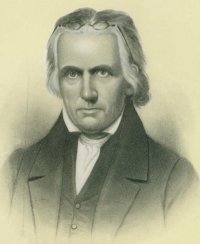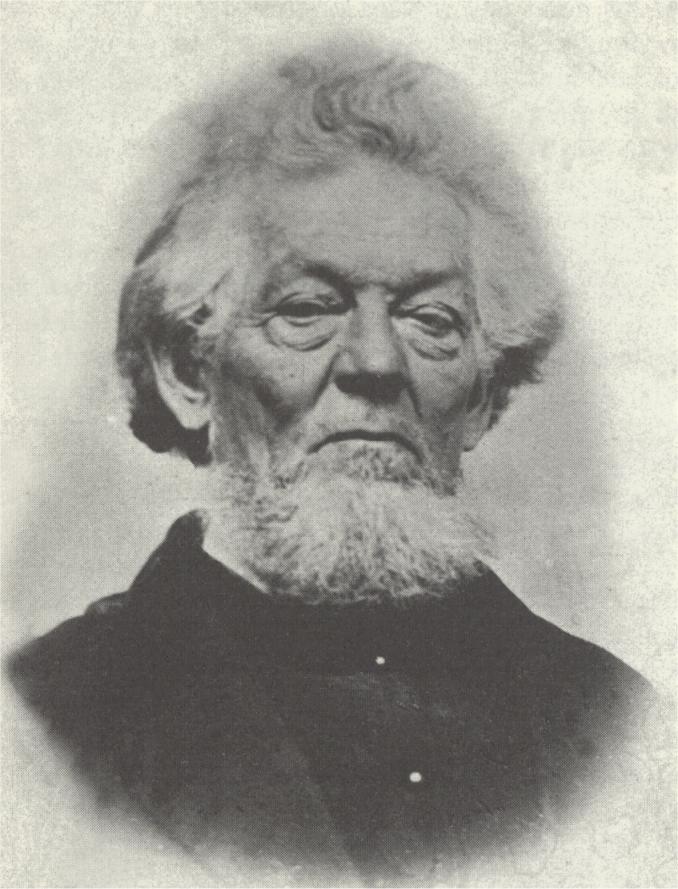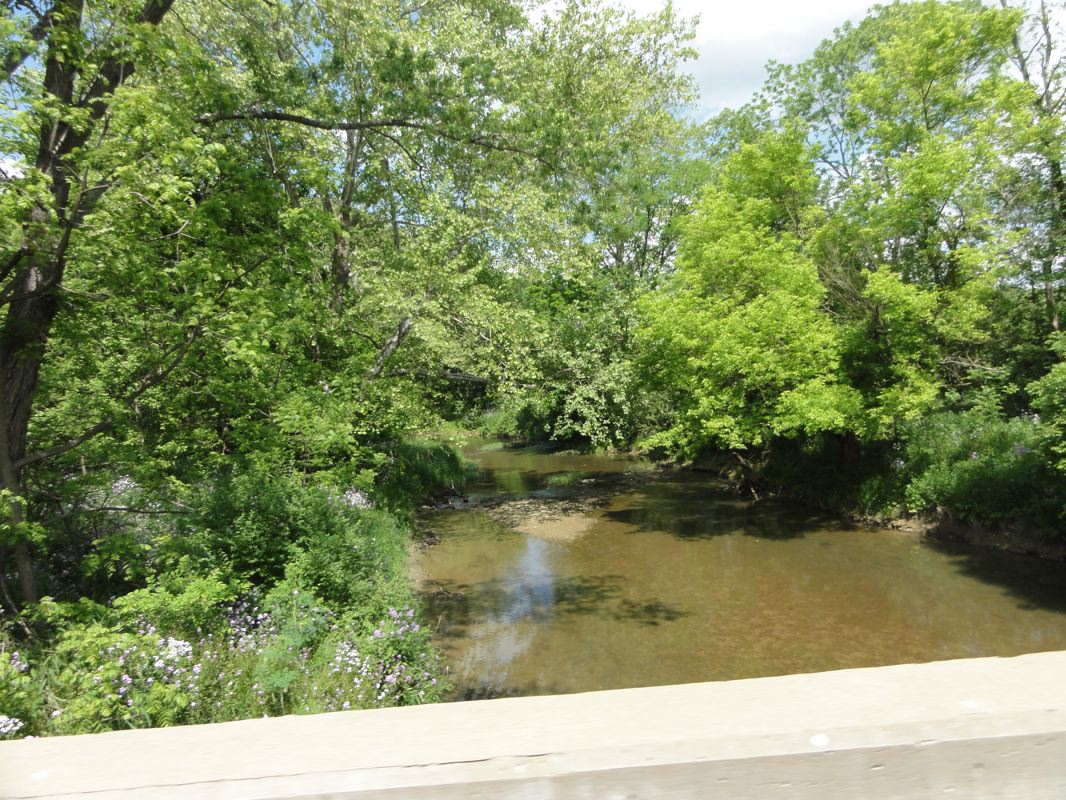The Campbell Baptisms On Buffalo Creek
June 12, 1812
![]()
Alexander Campbell’s Baptism
Over the years statements have been written as to whether Alexander Campbell understood his sins were being forgiven when he was being baptized. Some have affirmed that he was rebaptized because he realized that he did not understand.
This article calls attention to some statements that seem to indicate Campbell knew why he was being baptized, but this is not its main purpose. If anyone can document the quotation in this article by H. C. Harper, a reputable editor, who seemed confident of his source for a statement by Campbell concerning his baptism, please send this information to me. This may have been a personal letter Harper quoted, which cannot be documented. Any help would be appreciated.
Robert Richardson wrote Memoirs of Alexander Campbell, published in 1897. Concerning what Campbell understood at the time of his baptism, Richardson wrote, "The import and meaning of the institution of baptism was, however, still reserved for future discovery" (p. 405). Richardson was indicating that some time after Campbell's baptism, he began to understand the full import of baptism.
Does this statement mean that Campbell did not understand his sins were being forgiven when he was being baptized or that he simply gained a wider scope of learning concerning baptism as he continued to study? God alone may know. We know for sure that he later believed baptism essential for forgiveness, and he may have understood the same when he was baptized based on some of his later statements.
In A Debate Between A. Campbell and N.L. Rice, Christian Baptism, a book published in 1844, Campbell affirmed, "Baptism for the remission of sins, is the only baptism of which the New Testament knows anything. There never was any other ordained by God- John's baptism or Christ's baptism - there is no other" (p. 495).
Several years later, in 1853, Campbell published in Christian Baptism: With Its Antecedents and Consequents, in which he wrote:
"If any one be baptized for the Lord, for his death, or for his body, as a design, as an end, it is for the sake of the rights, privileges, and honours of his body, or for the sake of the rights, privileges, and honours accruing from his death, his church, or himself. Of all of these, remission of sins is the leading and the introductory blessing from which follow, as consequences, all spiritual privileges, honours and immunities.
"Evident, then it is, that there is no specific design on account of which any one can constitutionally be baptized, except it be for the remission of sins previously committed. We are not commanded to be baptized for faith, for repentance, for justification, for regeneration, for sanctification, for adoption, for the Holy Spirit, for eternal life. We are commanded to be baptized 'for the remission of sins.' . . . We are commanded to be baptized for one specific purpose, just as much as we celebrate the Lord's day and the Lord's supper for a specific purpose. Every Christian institution has, indeed, its own peculiar and specific object, which can be neither secured nor enjoyed so well as any other way" (p. 253).
Campbell's second wife, Selina Bakewell Campbell, responded after his death to those who wrote that Campbell was not baptized for the remission of sins. Her writing published in 1879 in American Christian Review declared: "Alexander Campbell was baptized in the full faith of the forgiveness of his sins, when baptized into Christ's death, and a full hope of the resurrection unto eternal life; having been planted in Christ in the likeness of his death, he was assured that he should participate in his resurrection; and this burial and resurrection imply a death unto him, and an enjoyment of a new life in Christ, no longer living a servant of sin, nor yielding his members to serve sin. Of course he was freed from the guilt and pollution of sin, and fully enjoyed a new life, with pardon of all his past sins for the promise was to him" (p. 379).
Some have questioned this assessment because of the writings of Campbell's *biographer, Robert Richardson. However, the question may be raised as to who best understood the mind of Campbell? (*Web editor note: The original article mistakingly entered "son-in-law" here. Richardson was many things to Campbell, but was never married any of his children. SDH, 06.17.2020)
In the first volume of the Millennial Harbinger, originally published in 1830 and reprinted in 1987 by College Press, Campbell wrote concerning the "comforts of forgiveness enjoyed by the first converts, contrasted with those now converted to the ancient gospel. ... The first Christians had just the same assurance of the remission of their previous sins as they had that Jesus was the Messiah. Their assurance that Jesus was the Messiah, was the same testimony confirmed and made accessible to them in immersion. Ask one of those converts if his sins were pardoned, he answered, Yes. Ask him how he knew, he replied, I was immersed in obedience to a divine command for the remission of my sins. And he that said, 'This is my beloved Son,' said also, 'Believe and be immersed for remission.' I believed and was immersed for the purpose upon the same testimony, and, therefore, as certain as I am that Jesus is the Messiah, so certain am I that all my former sins were remitted in immersion" (pp. 498-500).
Surely Campbell identified himself with people who had obeyed the ancient gospel. For this reason we conclude that at the time he wrote this in 1830, which was 18 years after his baptism, he considered that he had obeyed as had the first converts to Christianity.
Around 1917 Daniel Sommer, editor of the Apostolic Review, in a booklet, "An Exposure of an Unfortunate Man," reviewed a 24-page pamphlet written by Harper, the editor of The Apostolic Way. In his booklet, Sommer quoted a statement Harper made but which he did not document:
"His son Alexander," writing on this matter, says: "Down into the water I went, and was immersed into the name of the Lord Jesus for the remission of my sins - and you may rest assured, for that it is a fact that I declare to you, I felt myself as fully relieved from the burden of my former transgressions as ever did a man to whom the Lord said your sins are forgiven you" (p. 18).
We may never know for sure what was on the mind of Campbell when he was baptized, but such does not affect our salvation. Regardless of what he did or believed, our salvation depends on our responding in faith to Jesus' teaching by being baptized in the name of the Father and the Son and the Holy Spirit for the forgiveness of our sins (Matthew 28:19; Acts 2:38). Our salvation does not depend on what other people may have done but on our obeying Jesus (Hebrews 5:9) as our Lord and Savior.
Baptism is related to salvation as an act of faith that is rewarded because of the faith that motivates the act (Colossians 2:12). Even as Jesus' death for the forgiveness of sins was brought about by what other people did to Him, so also our salvation is brought about by what another does to us by burying and resulTecting us in baptism while in our hearts we are trusting in Jesus' blood to forgive our sins (Romans 3:25).
A good summary of baptism appears in After Jesus, the Triumph of Christianity, edited by Gayla Visalli: "One of the most dramatic rituals observed by the earliest Christians was baptism. Its aim was to wash away all uncleanliness resulting from sin, thus preparing the initiate for his or her new life. In its most basic form, the ceremony called for a confession of faith by the candidate, followed by complete immersion in water in the name of Jesus Christ" (p. 36).
-Owen D. Olbricht, Gospel Advocate, September, 1999, pages 33,34
![]()
Excerpt From The Memoirs Of Alexander Campbell
"On the 13th of March, 1812, his first child was born, a daughter, who was called Jane, after his mother. In recording the fact, he was so particular as to set down the very hour of her birth, 3 o'clock P. M. Soon after this event, a considerable change took place in his views in regard to baptism. His wife, with her father and mother, was still a member of the Presbyterian Church, and, as the child grew, it is natural to suppose that the question of infant baptism became to him one of immediate practical interest. It is certain, at least, that up to this period he does not appear to have given to the subject of baptism a sufficiently careful attention. The unity of the Church, the overthrow of sectarianism and the restoration of the Bible to its primitive position, had been the leading objects with him, and with his father; and, regarding the question of baptism as one comparatively of small importance, they seem to have left it, in a good degree, undecided in their own minds. On the 3d of February, 1810, and again on the 19th May, 1811, as well as on the 5th of June following, Alexander had delivered a sermon upon Christ's commission to the apostles, Mark xvi. 15, 16, in which his position in regard to baptism at those periods is distinctly stated, and in which he said in reference to it: "As I am sure it is unscriptural to make this matter a term of communion, I let it slip. I wish to think and let think on these matters."
"His failure, thus far to recognize the truth in relation to this vexed question, was another instance of the truth of the adage, which is perhaps nowhere so often verified as in the affairs of religion, that "a man may look at a thing without seeing it." The subject had been more than once before him, and constituted a part of the text of the sermon above referred to, which he had preached several times; yet owing to the particular standpoint from which he had been taught to regard baptism, he had entirely failed to recognize its actual importance. As there is one angle of incidence in which light is absorbed by an object, and another in which it is reflected from it, and as an object assumes various appearances according to the relative position of the observer, so it is in regard to things contemplated by the mind. Viewed from the standpoint of his early education, infant baptism was a rite justified, inferentially at least, and not to be neglected. Viewed from the platform of the principles of the reformation urged by his father and himself, it possessed no Divine authority, yet as an ancient usage, and for the sake of peace, it seemed to them expedient to allow its continuance in the case of such members as conscientiously believed it proper. Most of the members of the Church furthermore, supposed themselves to have been in their infancy already introduced into the Church by its means, and even after Alexander discovered it to be unauthorized, he seems to have concurred, for the time, in the plausible sophism proposed by his father which begged the very point at issue, "that it was not now necessary for them to go, as it were, out of the Church merely for the purpose of coming in again by the regular and appointed way."
"Under the influence of these conflicting and involved opinions, Alexander Campbell seems to have suspended his former investigations, and to have forborne giving to this subject that impartial and continued attention necessary to the discovery of truth. From the embarrassing circumstances of his position, he, as he states in the above sermon, concluded to "let it slip"--to pass it by as a matter of little relative importance, and to allow the question to remain as it was. From the occasional and incidental discussions of the subject, however, that occurred among the members of the Brush Run Church, there seems to have been a gradually increasing conviction, on the part of many, that baptism was a matter of much more importance than they had supposed, and Alexander himself began to share in this conviction. He began to perceive that an ordinance of which, in the commission to the apostles, Christ had deemed it necessary to speak particularly, and which he had there connected directly with the salvation of the gospel, in the declaration that "he that believeth and is baptized shall be saved," could not be one of those unimportant matters of opinion which might be allowed "to slip." Admitting that infant baptism was without warrant, the question began to assume quite a different aspect, and was no longer, "May we safely reject infant baptism as a human invention?" but, "May we omit believers' baptism, which all admit to be divinely commanded?" If the baptism of infants be without warrant, it is invalid, and they who receive it are, in point of fact, still unbaptized. When they come to know this in after years, will God accept the credulity of the parent for the faith of the child? Men may be pleased to omit faith on the part of the person baptized, but will God sanction the omission of baptism on the part of the believer, on the ground that in his infancy he had been the subject of a ceremony which had not been enjoined? On the other hand, if the practice of infant baptism can be justified by inferential reasoning or any sufficient evidence, why should it not be adopted or continued by common consent, without further discussion?
"Such were some of the reasonings which, at this time, pressed upon the mind of Alexander Campbell. Being exceedingly conscientious, and sensible of the responsibilities appertaining to the new relation in which he stood, as a father, he was led to think much more earnestly upon the whole subject, so that he might not be found wanting in any duty that was really required of him. Recalling to mind the little discussion with Preacher Riddle of the Associate Reformed Church, in regard to the principles of the "Declaration and Address," in which Mr. Riddle said "there was no direct authority in the Scriptures for infant baptism," he determined that he would, at least, make an effort to settle his mind finally upon the subject. Abandoning, then, all uninspired authorities, he applied himself to the Scriptures, and searching out critically the signification of the words rendered baptism and baptize in the original Greek, he soon became satisfied that they could mean only immersion and immerse. From his further investigations, he was led finally to the clear conviction that believers, and believers only, were the proper subjects of the ordinance. He now fully perceived that the rite of sprinkling to which he had been subjected in infancy was wholly unauthorized, and that he was consequently, in point of fact, an unbaptized person, and hence could not, consistently, preach a baptism to others of which he had never been a subject himself. As these points were for some time matters of anxious inquiry, he frequently conversed upon them with his wife, who also became much interested in them, and finally came to the same conclusions with himself.
"As he was not one who could remain long without carrying out his convictions of duty, he resolved at once to obey what he now, in the light of the Scriptures, found to be a positive Divine command. Having formed some acquaintance with a Matthias Luce*, a Baptist preacher, who lived above Washington, he concluded to make application to him to perform the rite, and, on his way to visit him, called to see his father and the family, who were then living on the little farm between Washington and Mount Pleasant. Soon after arriving, his sister Dorothea took him aside, and told him that she had been in great trouble for some time about her baptism. She could find, she said, no authority whatever for infant baptism, and could not resist the conviction that she never had been scripturally baptized. She wished him, therefore, to represent the case on her behalf, to her father. At this unexpected announcement, Alexander smiled, and told her that he was now upon his way to request the services of Mr. Luce*, as he had himself determined to be immersed, and would lay the whole case before their father. He took the first opportunity, accordingly, of presenting the matter, stating the course he had pursued and the conclusions he had reached. His father, somewhat to his surprise, had but little to say, and offered no particular objections. He spoke of the position they had heretofore occupied in regard to this question, but forbore to urge it in opposition to Alexander's conscientious convictions. He finally remarked, "I have no more to add. You must please yourself." It was suggested, however, that in view of the public position they occupied as religious teachers and advocates of reformation, it would be proper that the matter should be publicly announced and attended to amongst the people to whom they had been accustomed to preach; and he requested Alexander to get Mr. Luce* to call with him on his way down, at whatever time might be appointed.
"Wednesday, the 12th day of June, 1812, having been selected, Elder Luce*, in company with Elder Henry Spears, called at Thomas Campbell's on their way to the place chosen for the immersion, which was the deep pool in Buffalo Creek where three members of the Association had formerly been baptized. Next morning, as they were setting out, Thomas Campbell simply remarked that Mrs. Campbell had put up a change of raiment for herself and him, which was the first intimation given that they also intended to be immersed. Upon arriving at the place, as the greater part of the members of the Brush Run Church, with a large concourse of others, attracted by the novelty of the occasion, were assembled at David Bryant's house, near the place, Thomas Campbell thought it proper to present, in full, the reasons which had determined his course. In a very long address, he accordingly reviewed the entire ground which he had occupied, and the struggles that he had undergone in reference to the particular subject of baptism, which he had earnestly desired to dispose of, in such a manner, that it might be no hinderance in the attainment of that Christian unity which he had labored to establish upon the Bible alone. In endeavoring to do this, he admitted that he had been led to overlook its importance, and the very many plain and obvious teachings of the Scriptures on the subject; but having at length attained a clearer view of duty, he felt it incumbent upon him to submit to what he now plainly saw was an important Divine institution. Alexander afterward followed in an extended de fence of their proceedings, urging the necessity of submitting implicitly to all God's commands, and showing that the baptism of believers only, was authorized by the Word of God.
"In his remarks, he had quoted, among other Scriptures, the command of Peter to the believers on the day of Pentecost: "Repent and be baptized, every one of you, in the name of Jesus Christ, for the remission of sins, and you shall receive the gift of the Holy Spirit;" and had dwelt at length upon the gracious promises of God to all who should obey him. When he had concluded, James Hanen, who, with his wife, had also concluded to be baptized, took his child from its mother's arms, and requesting her to walk aside, asked her what she thought of the declaration of Peter, "You shall receive the gift of the Holy Spirit," and how she understood it. Mrs. Hanen, being well acquainted with the Scriptures, soon gave a satisfactory reply, and both were accordingly baptized along with the rest, consisting of Alexander Campbell and his wife: his father and mother, and his sister--in all seven persons. Alexander had stipulated with Elder Luce* that the ceremony should be performed precisely according to the pattern given in the New Testament, and that, as there was no account of any of the first converts being called upon to give what is called a "religious experience," this modern custom should be omitted, and that the candidates should be admitted on the simple confession that "Jesus is the Son of God." These points he had fully discussed with Elder Luce* during the evening spent at his house when he first went up to request his attendance, and they had been arranged as he desired. Elder Luce* had, indeed, at first objected to these changes, as being contrary to Baptist usage, but finally consented, remarking that he believed they were right, and he would run the risk of censure. There were not, therefore, upon this occasion, any of the usual forms of receiving persons into the Church upon a detailed account of religious feelings and impressions. There was, indeed, no Baptist church-meeting to which any such "experience" could have been related, Elders Luce* and Spear, with Elder David Jones of Eastern Pennsylvania, being the only Baptists known to have been present. All were, therefore, admitted to immersion upon making the simple confession of Christ required of the converts in the apostolic times. The meeting, it is related, continued about seven hours. Before it commenced, Joseph Bryant had to leave, in order to attend a muster of volunteers for the war against Great Britain, which, it was reported, Congress had declared on the fourth day of the same month, June, although the declaration was not formally made until the 18th. After attending the muster, he returned home in time to hear an hour's preaching and to witness the baptisms. Such were the leading incidents of this eventful occasion, which gave to the reformatory movement an entirely new phase, and was productive of the most important consequences.
"It will be easily perceived, that the conclusions which were thus practically carried out, had been reached only through a series of severe mental struggles. The difficulties in the way of Thomas Campbell, especially, had been very great, not only from the predilections arising from his early education, and the fact that he had been for about twenty-five years a pædobaptist minister, but from the very natural desire he had felt, since he commenced his efforts to secure Christian union, to avoid everything likely to frustrate this desirable object. He had no idea, indeed, in the beginning, that to take the Bible alone would really lead to the abandonment of infant baptism; and although this result was, at an early period, plainly predicted by others, he constantly cherished the hope that the practice might, consistently with his principles, be allowed as a matter of forbearance. Subsequently, he had consented to immerse three members of the Association, and seemed to have become satisfied that scriptural baptism implied the burial of the person in water. But he still appeared to cling to the opinion that the ordinance was of far less importance than Christian unity, and that the various questions connected with it might be left to the decision of each individual, so that he hesitated to adopt positively any view of the subject that would render his overture less acceptable to the religious public. Whilst his own mind remained in this state of incertitude, many of those connected with him had advanced beyond him, but were restrained from carrying out their convictions by the respect which they felt was due to his position. When, however, his favorite son and daughter announced to him their conclusions, he found it necessary to come himself to a decision, which, upon his own principle of being guided exclusively by Scripture, he felt could not be different from theirs. This was a necessity which he had evidently longed to avoid, since he was aware it would at once erect an impassable barrier between him and the pædobaptist community in which he had labored, and frustrate all his hopes of winning it over to his views of Christian union. It was his love of truth; his own conscientious convictions, and his desire to please God rather than men, that could alone have enabled him thus to yield up his cherished hopes, and to see the road, which had at first seemed to him so broad that all religious parties could walk therein together, gradually diminish into a comparatively narrow path. That road, however, had appeared broad at first merely because its limits were not as yet properly defined; and although he found it narrowed, when, under the Divine instructions, its boundaries were more distinctly traced, he had an increasing assurance that it was the way that "leadeth unto life."
"It is perhaps useless to speculate as to what might have been the result of the reformatory movement initiated by Thomas Campbell, had he continued to insist upon the loose views he had previously entertained upon the subject of baptism. It is extremely doubtful if his well-meant efforts could ever have made any considerable impression upon the religious community at large, so completely wedded as it was, at this period, to sectarianism. The religious denominations could never have been persuaded to discard their speculations, traditions or ecclesiastical usages, and to sit down together harmoniously to learn the truth from the Bible alone. Such a spectacle as this, indeed, like the example of the Bereans of old, would have been most cheering and hopeful. But it is not upon any general principle, or even by the adoption of a few particular truths, that a real Christian union can he established. This demands at least a willingness to receive the whole truth, and involves a spiritual unity with Him who is the Way, the Truth and the Life; for that alone which unites the human soul to Christ can unite Christians to each other. A mere conglomeration, then, of the religious parties upon the admitted principle that the Bible is the only rule of faith and practice, would by no means have secured a religious peace. It could have been, at best, but a temporary truce amidst permanent hostilities, unless the spirit of partyism could have been replaced by the spirit of Christ, and there existed a sincere determination to follow the truth whithersoever it would lead. It is probable, therefore, that, in the existing state of things, the mild and gentle overtures of Thomas Campbell would have been disregarded in the future, as they had been thus far in the past; and that the little band which had rallied round the standard of peace, would have been, after a time, dispersed or blended with the existing parties. There needed, at this crisis, one to take the lead, who was of a more adventurous spirit, and who, realizing better the real posture of affairs, could recognize the truth that peace could be reached only through victory.
"From the moment that Thomas Campbell concluded to follow the example of his son in relation to baptism, he conceded to him in effect the guidance of the whole religious movement. As for himself, it was evident that he had previously accomplished his special mission in propounding and developing the true basis of Christian union. Considering his antecedents, he had made an astonishing progress in this noble work, not only unaided, but in the midst of hinderances and obstacles which, to thousands in similar circumstances, would have proved wholly insurmountable. But it was difficult for him to advance beyond the general principles laid down in the "Declaration and Address" to the practical and unforeseen results which those principles involved. Had it not been for the decision and the untrammeled views of his son at this juncture, and especially for that marked quality of conscientious mental independence which he seems to have largely inherited from his mother, the reformation would not probably, as already intimated, have advanced a single step beyond the general results attained in vindicating the claims of the Bible as the only rule of faith and practice. Hence it was, that Thomas Campbell's long discourse at the baptism, while it was a rehearsal of his own anxious struggles, and a faithful testimony to his steady adherence to the Divine light by which he had been led, and by which he had thus far successfully led others, was, at the same time, virtually the surrender of that guiding light into the hands of a successor. From this hour, therefore, the positions of father and son were reversed, and each tacitly occupied the position allotted to him. Alexander became the master-spirit, and to him the eyes of all were now directed. He felt that Providence had placed him in the advance. He must lead the way, for conscience, enlightened by the Word of God, impelled him irresistibly forward. On neither side, however, was there the slightest feeling of rivalry or ambition. On the contrary, as before, it was still a constant and affectionate co-operation. Alexander's habitual deference for his father's extensive and accurate knowledge of the Bible, and his unalterable filial regard, led him constantly to confer with him in respect to Divine things; while his father, apparently conscious that his chief mission had been accomplished, gladly recognized, in his admired and greatly beloved son, a superior ability to appreciate, grasp, promulgate and defend the cause which he had so long labored to promote. He delighted, accordingly, to hold council with his son, and to discuss with him the momentous matters in which they were engaged, so that no new truth was ever adopted or disseminated without having undergone the careful scrutiny of the minds of both, and frequently of those of others also who formed part of the household or of the social circle.
"At the next meeting of the church of Brush Run, which was on the Lord's day succeeding the baptism of the seven, thirteen other members, and among them James Foster, requested immersion, which was accordingly administered by Thomas Campbell, each one making the simple confession of Christ as the Son of God. On subsequent occasions, some others came forward in like manner, so that the great majority of the church speedily consisted of immersed believers, upon which, the other individuals who had been in the Association abandoned the cause, being unwilling to follow the reformatory movement any further. Among the latter was General Acheson, who, indeed, for some time previously, seemed to have lost his interest in the movement he had at first so warmly espoused. Thus it was with these reformers as it had been with the Haldanes and their coadjutors. The truth respecting baptism forced itself at length upon the convictions of most of those who were active in these respective reformations, in spite of educational prejudices and the difficulties of their position. And thus it was also with the church at Brush Run, as it had been with the Haldanean church at Edinburgh--immersion, apt emblem of separation from the world, occasioned a separation among those who had been previously united in religious fellowship.
"Upon the whole, then, it will be seen that a very great progress had now been made, and that a very great change had been effected, at least in the external aspect of this little community of reformers. Immersion had been unanimously adopted as the only true scriptural baptism; infant baptism had been finally and absolutely rejected as a human invention, and the simple confession of Christ, made by the early converts to Christ, was acknowledged as the only requirement which could be scripturally demanded of those who desired to become members of the Church. As all these matters were determined by the plain authority of Scripture, they have ever since continued to be prominent features of this religious movement. During their course, thus far, this band of reformers had recognized themselves to be, not a sect, with its truths and errors equally stereotyped and equally immutable, but a party of progress--as learner's in the school of Christ. "Whereto they had already attained," they endeavored "to walk by the same rule and to mind the same things." In seeking for "the old paths" they had, thus far, found each new truth to lead them to another still more obvious, as a single track often guides the traveler, lost in the forest, to a pathway, which in turn conducts him to one still wider and more easily pursued. The necessity felt for unity brought them to the Bible alone; this led them to the simple primitive faith in Christ, and this, in turn, had now guided them to the primitive baptism as the public profession of that faith. The full import and meaning of the institution of baptism was, however, still reserved for future discovery.
-Robert Richardson, Memoirs Of Alexander Campbell, Volume 1, pgs. 391-405
![]()
The Locations Of The Baptisms Of The Campbells
The Traditional & Actual Locations
There are two spots that have been referred to as the locations on Buffalo Creek where Alexander Campbell and his family were baptized. The traditional location that is cited by well-meaning historians is on Hwy. 331 at the bottom of the hill leading down from the Brush Run church location. The problem with this location is that the creek is not Buffalo Creek, but Brush Run Creek. The Memoirs of Alexander Campbell, Volume 1, page 396, says that it took place on Buffalo Creek, on the property of David Bryant. The location often shown as the baptism location was not on the Bryant property. The location may, or may not have ever been used by the church. No one knows for sure. However it is often shown as being the place where it happened. The directions from the Brush Run church location to the traditional location is: From the Brush Run location on Farrar School Road, go back down the hill and turn left on Farrar School Road. Head back down to the bottom of Farrar School Road to Hwy. 331/Brush Run Road. Turn left (east) on Hwy. 331 about 3/10ths of a mile. On the right, there is a field that leads out toward the creek. Today there is a fenced enclosure between the road and the creek, but the location needs maintaining. This is NOT the location where the Campbells were baptized.
The second, and most accurate location came to your web server's attention a several years ago by way of conversation with a Christian church minister and historian, Jim McElhaney. Jim lives near Bethany, West Virginia and kindly met my wife, Jenny and I at the Campbell mansion back in the fall of 1997. We followed him up to the Brush Run location. Then, we followed him what seemed like miles through back roads. Then we pulled over in open wilderness where McElhaney proceed to point into deep woods saying that the old grist mill location existed. He said I was welcome to walk across the field, but that when I got to the creek there would be nothing there to tell me specifically where the baptism took place. Also, he noted that as the baptisms took place 200 years ago, there was really no telling how the track of the creek may have changed over the years.
Here is an observation to consider. On July 4, 1811, just a year previous to Campbell's baptism, when the church at Brush Run was planted, Thomas Campbell immersed three people in the same location on Buffalo Creek. Richardson explained the setting by saying that Thomas, "consented, therefore, to perform the ceremony, which took place on the 4th of July in a deep pool of Buffalo Creek, about two miles above the mouth of Brush Run, and on the farm of David Bryant. The pool was narrow, and so deep that the water came up to the shoulders of the candidates when they entered it. Thomas Campbell, then, without going into the water, stood on a root that projected over the edge of the pool, and bent down their heads until they were buried in the liquid grave, repeating at the same time, in each case, the baptismal formula. (Memoirs of Alexander Campbell, Volume 1, 371,372) So, there must have been plenty of water there. As it says that the pool was about two miles south of the mouth of Brush Run, you will see below where this location would have been on Buffalo Creek.
On June 12, 1812, after encouraging Elder Matthias Luse of the Baptist church to assist, seven people were baptized in Buffalo Creek. They were, Thomas and Jane Campbell, their son Alexander, and his wife Margaret Campbell, Dorothea Campbell, Alexander's sister, and Mr. & Mrs. James Hanen. (Memoir of A.C., Volume 1, p.396). GPS Location of Traditional Site Of Campbell Baptisms: 40.201541,-80.400945
![]()
Photos Of The Traditional Baptismal Location
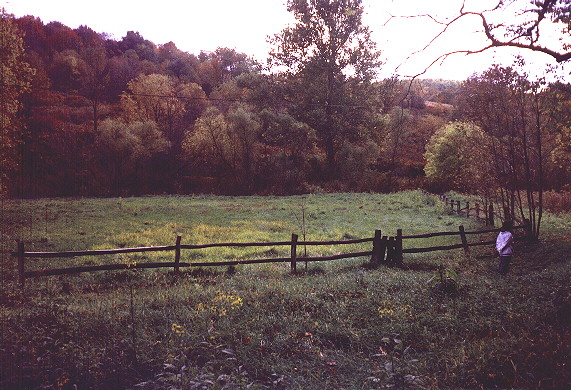
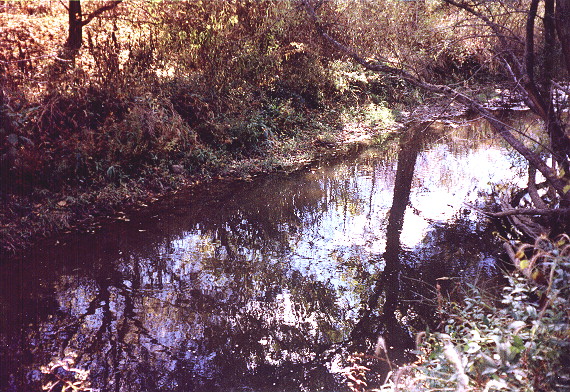
![]()
Directions To The Baptism Site Of The Campbells
Actual Location
In southwestern Pennsylvania, take I-70 to Exit 4. and turn north (if coming for WV turn left, if from Washington, Pa, turn right). Go up to Hwy. 40 and turn right. Go into Claysville and turn left on Hwy 231. Go 5.8 miles and Hwy. 231 will turn to the right. Turn right and continue out Hwy. 231. You will begin making your way down toward a creek bed. The first bridge you cross is probably the closest place anyone is going to see the burial site. At the bridge's crossing, you are right in the middle of the old David Bryant farm where the baptism took place. However, the grist mill is long gone, and there is no actual place that identifies the actual spot. The bridge crosses Buffalo Creek, but locals have said that the actual spot is further down the creek on your right. So, if you get a chance to inspect the GPS location below. Follow the creek around to the right of Hwy.231 on the dirt road for about a mile and a half to the spot. There will be a little walk over to spot.
According to the Memoirs of Alexander Campbell, Vol. 1, page 371 "He consented, therefore, to perform the ceremony, which took place on the 4th of July in a deep pool of Buffalo Creek, about two miles above the mouth of Brush Run, and on the farm of David Bryant. Thus, 2 miles above the mouth of Brush Run Creek, puts the site at the coordinates below. The photos below are of Buffalo creek at the bridge about a 420 yards or 1/4 mile above the mouth of Brush Run Creek where Hwy. 231 crosses Buffalo Creek. GPS Location of Actual Location of Campbell Baptisms: 40.177791,-80.42853
![]()
Photos Close To The Actual Location Of The Baptisms
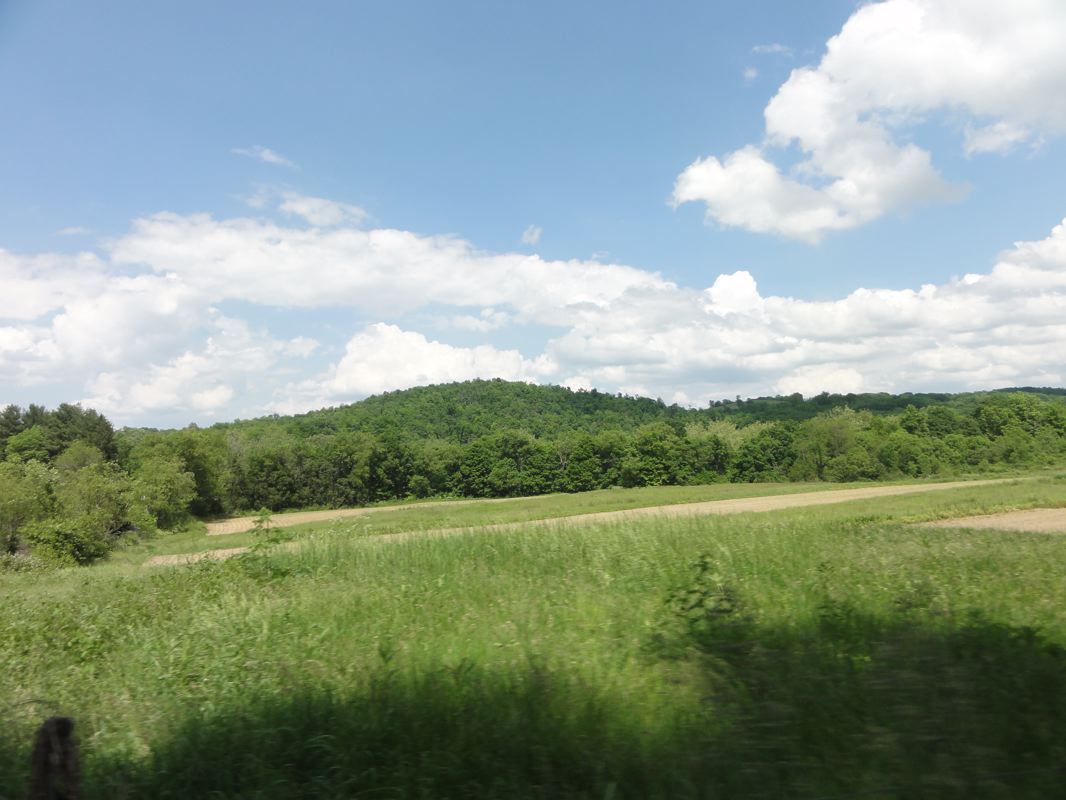
From Hwy. 231 looking out toward the row of trees curving about. Just behind the trees is Buffalo Creek. Another mile and a half
up the creek is the baptismal pool for the seven baptized on June 12, 1812

Coming Up On Bridge Over Buffalo Creek - about 1 3/4 miles up Buffalo From Baptismal Pool
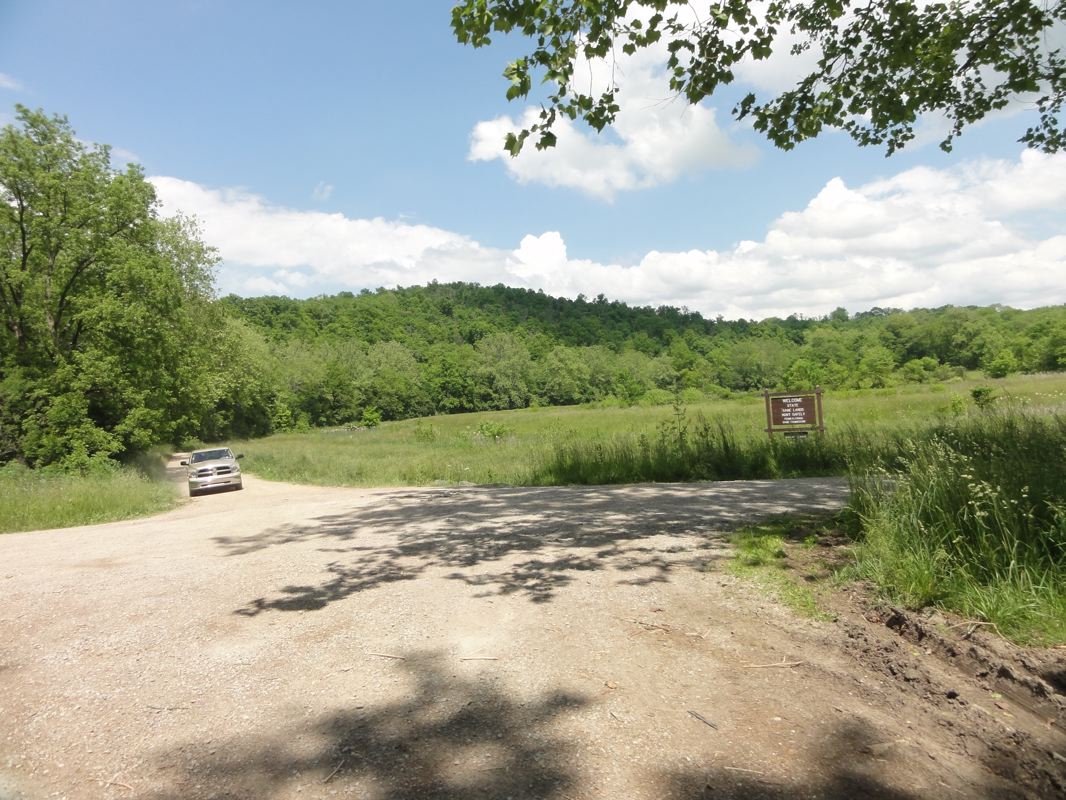
From Hwy. 231 - Head down road where truck is coming out about 1 3/4 miles. Cross field toward creek to find baptismal pool

This bridge is on Hwy 231, about 1 3/4 miles downstream from Campbell baptismal location

About 1 3/4 miles up the creek from this spot on Buffalo Creek is where the Campbells were baptized
![]()
Photos Taken May 23, 2012
Courtesy of Scott Harp
www.TheRestorationMovement.com
In May, 2012, Tom Childers drove me up to the homesite of Alexander Campbell, Bethany, West Virginia. We took the photos you see here, a location a few miles east of Bethany, West Virginia. The baptismal pool where the Campbells were immersed on Buffalo Creek in 1812 is a location that we will hopefully explore better someday.
*The spelling of the last name of Matthias Luse has been written differently through the years. "Luse" appears on the graves of both he and his wife south of Washington, Pennsylvania.
![]()
![]()
